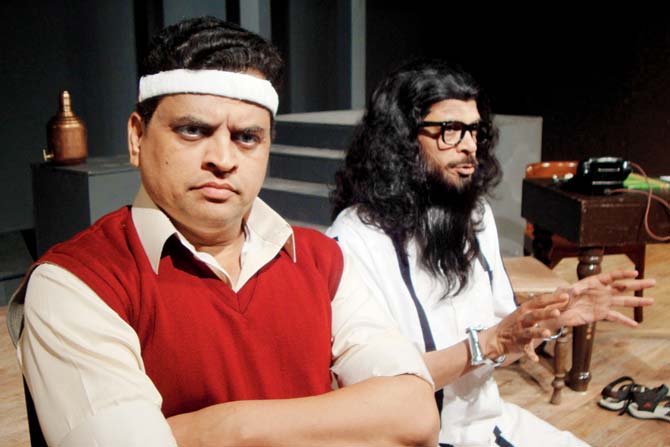28 January,2017 11:29 AM IST | | Jane Borges
Sharad Ponkshe on playing Mahatma Gandhi's assassin for nearly two decades in a landmark play, only to write a new script after revising the character

Marathi actor Sharad Ponkshe continues to get threats for playing Mahatma Gandhi's assassin Nathuram Godse

Sharad Ponkshe and Vivek Joshi in Hey Ram Nathuram
On January 11, some time after Marathi actor Sharad Ponkshe took to stage to perform his most infamous role at a theatre hall in Sindhurhurg, the audience broke into collective frenzy. The seasoned actor, who until then had seized everybody's attention with his dramatisation of Mahatma Gandhi's assassin Nathuram Vinayak Godse, remembers being distracted by two women who stood up and hurled two bottles of ink at him. "The ink was all over my costume," he recalls.
Just then, somebody in the audience screamed out, "Bapu hum sharminda hain, tumhara kaatil zinda hain (Bapu, we are embarrassed, your murderer is still alive)."
Amused that the audience actually saw him as Godse, Ponkshe continued with the scene even as security hauled this willful, unwanted cast out of the hall. "How could I have killed Gandhi? Gandhiji died in 1948, I was born in 1966. Why say things that have you look stupid?" he says.
Ponkshe, though, isn't new to the politics of hate. Having played Indian history's most disliked antagonist, Godse, for nearly 19 years - first in the controversial Marathi drama Me Nathuram Godse Boltoy, later in the 2000 period film Hey Ram, and most recently, in a play that he scripted - the actor has faced repeated threats, to the point that he has become indifferent. "It hasn't stopped me from playing Godse. It never will," he says. Only last week, Nationalist Congress Party workers clashed with Shiv Sainiks over the staging of the play in Nagpur.
Pic /Nimesh Dave
Currently, in Mumbai to prepare for the 50th show of his new play, Hey Ram Nathuram, Ponkshe tells us why Godse is still evolving as India's anti-hero. The fact that January 30 marks the 69th year since Godse pulled the trigger isn't lost to the actor.
"History text books reduced his life to one sentence: The man who assassinated Gandhi. But, he has such a fascinating story."
It's this obsession with Godse's story that pushed him to write a new play. Two years ago, after running to packed houses for 17 years and completing 817 shows, when Me Nathuram Godse Boltoy's successful stint was brought to an abrupt end by its producer, Ponkshe was the unhappiest. "I thought I had at least four more years to play Godse," says Ponkshe, 51, who first played the character when he was 32. "But, the producer was doneâ¦he didn't want to stage it ever again," the actor adds. So, Ponkshe decided to write it himself.
With Hey Ram Nathuram, he says, he got the opportunity to revisit Godse. Ponkshe prefers describing the play as a sequel. Like the previous one, the plot is set right after Gandhi was killed, with Godse laying bare his reasons for committing the crime. "I have opted for a more realistic approach and made him look less hero-like," says Ponkshe. One interesting addition is a scene where Ramdas Gandhi and Godse meet just eight days before the latter is hanged. "Ramdas had pleaded for commutation of the death penalty. But, the two never met in their lifetime. They were always in touch through letters. I brought those letters to life with this imagined scene," he says.
Ponkshe, who is a Shiv Sainik, like the character he plays, is unabashedly pro-Hindutva. It's not tough to imagine him as Godse, when he speaks of Gandhi. "Yes, Gandhiji was a great man. But, we forget he was human. Don't human beings make mistakes? And, mistakes made by great human beings have devastating repercussions," he says.
"Gandhiji wanted to unite Hindus and Muslims. And, he would repeatedly go on hunger strikes to ensure that it happened. But, history is proof that these two groups were dissimilar in ideology. They wanted different things and this resulted in a lot of bloodshed," says the playwright. While not supporting Godse's line of action, he insists that history needs to investigate why Gandhi's assassin did what he did.
"Because I have been involved with Godse's character for such a long time, I felt the need to read up on his motivation. I read the Bible, Quran and several books on Gandhi and Godse. It gave me a 360-degree view of the person I had to play," he says. "Godse was himself a Gandhi bhakt. But, somewhere down the line, things got ugly after Partition. Gandhiji's open support for Muslims didn't go down well with him."
When Godse died, his only request was that he be allowed to hold the Bhagwad Gita and the saffron flag, representing undivided India. This last, haunting scene is also revisited in Ponkshe's new play. Without delving deeper into the politics of Godse, Ponkshe ends by saying that the antagonist wasn't a rebel without a cause.